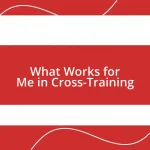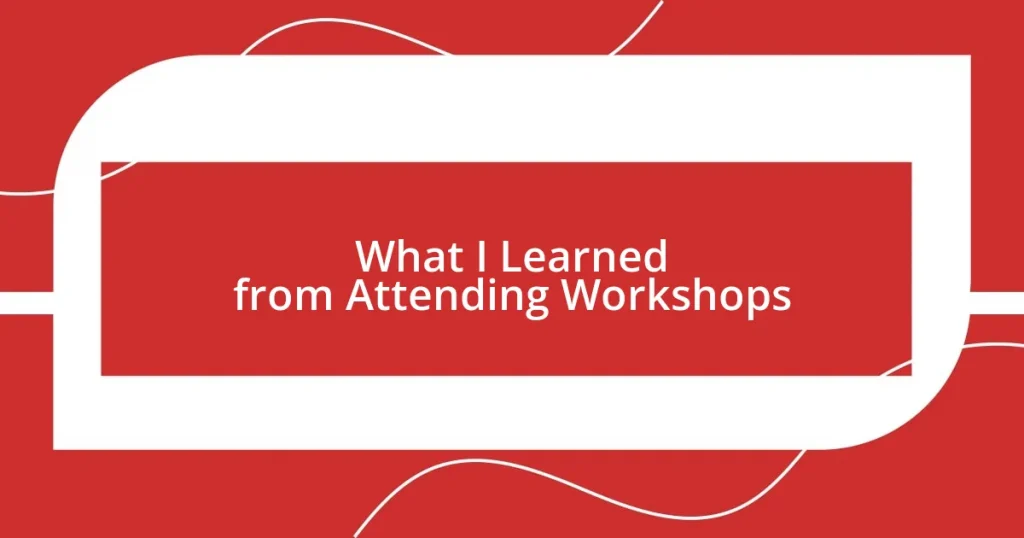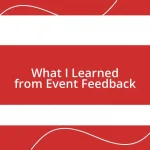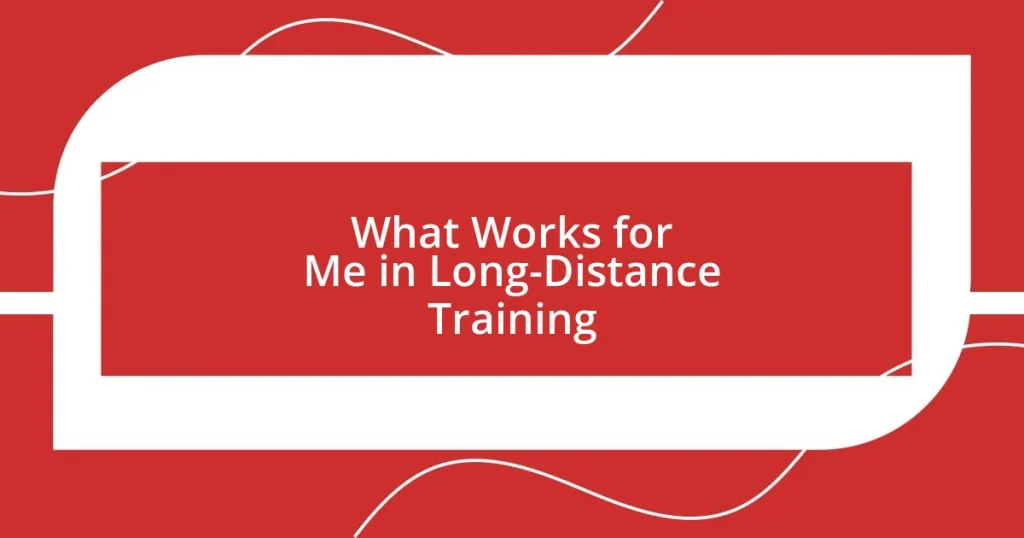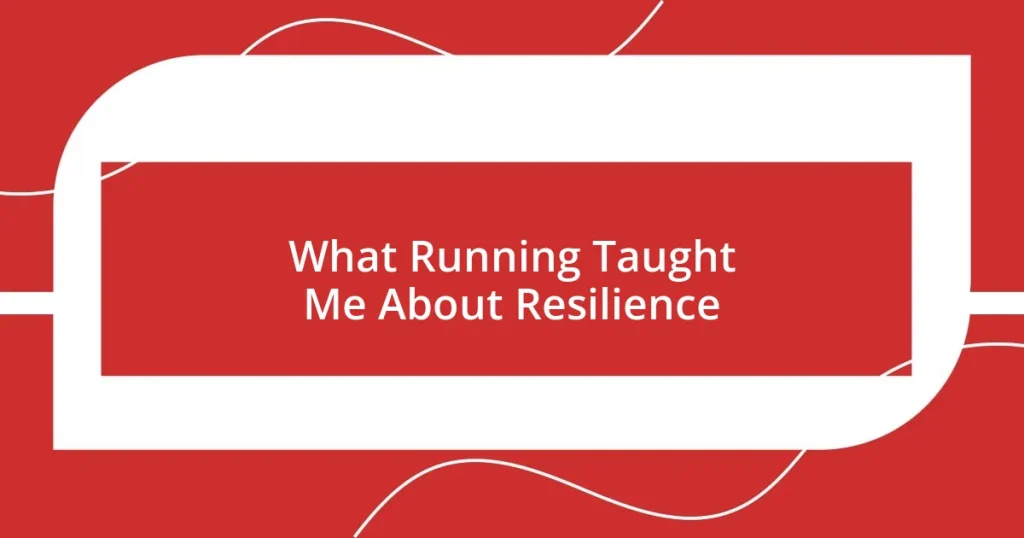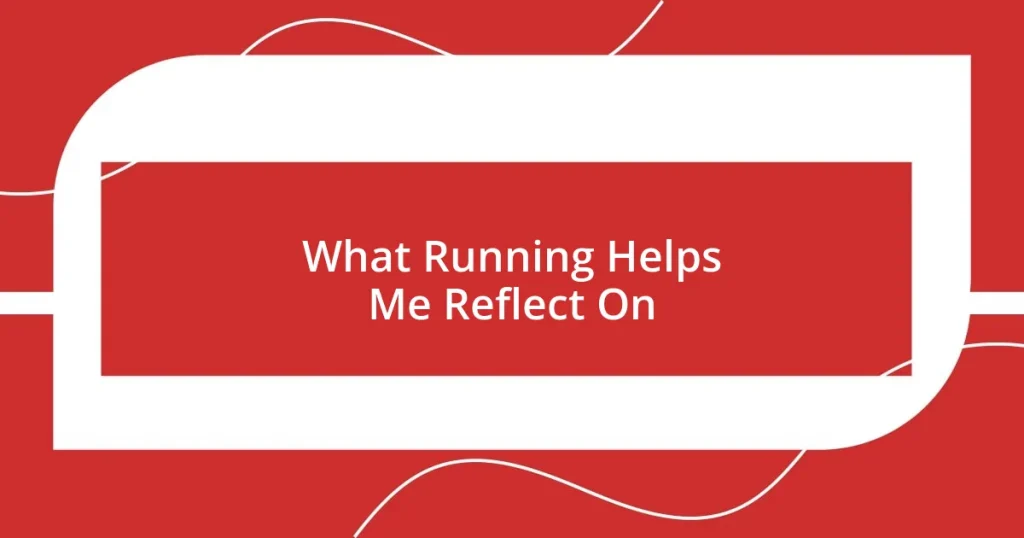Key takeaways:
- Workshops foster personal and professional growth by providing hands-on learning experiences, networking opportunities, and immediate feedback.
- Key skills gained include effective communication, adaptability, and problem-solving through collaborative activities.
- Active participation, such as asking questions and engaging with peers, enhances understanding and retention of knowledge.
- Post-workshop actions like reflection, follow-ups, and maintaining connections are crucial for applying learned skills and fostering a supportive network.
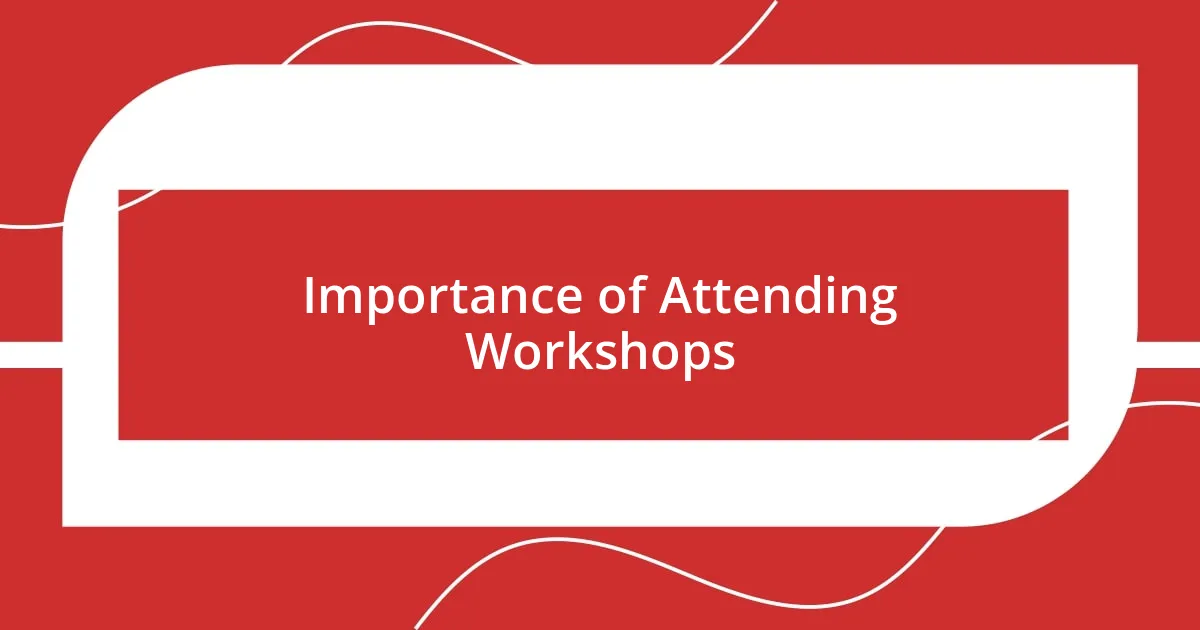
Importance of Attending Workshops
Attending workshops has truly been a game-changer in my professional journey. I vividly remember a workshop I attended on effective communication skills. It wasn’t just about learning techniques; it was about engaging with others, sharing experiences, and realizing how our struggles and triumphs are often shared, making me feel part of a larger community. Have you ever felt that sense of connection with others? It’s powerful.
Moreover, workshops provide a unique opportunity to gain new perspectives that can shift your thinking. After learning about innovative problem-solving strategies in a recent session, I applied those methods to a project at work. The result? An unexpected breakthrough that not only impressed my team but also renewed my enthusiasm for my job. I often wonder how many insights I would have missed if I hadn’t attended that workshop.
The hands-on experience that workshops offer is invaluable. I recall a particular workshop where we broke into small groups to tackle real-life scenarios. The collaborative problem-solving was exhilarating! It reminded me that learning isn’t just about theory; it’s about applying knowledge in practical ways and working alongside other like-minded individuals. In what ways do you think practical learning could enhance your expertise? You might be surprised by the answers when you dive into workshop experiences.
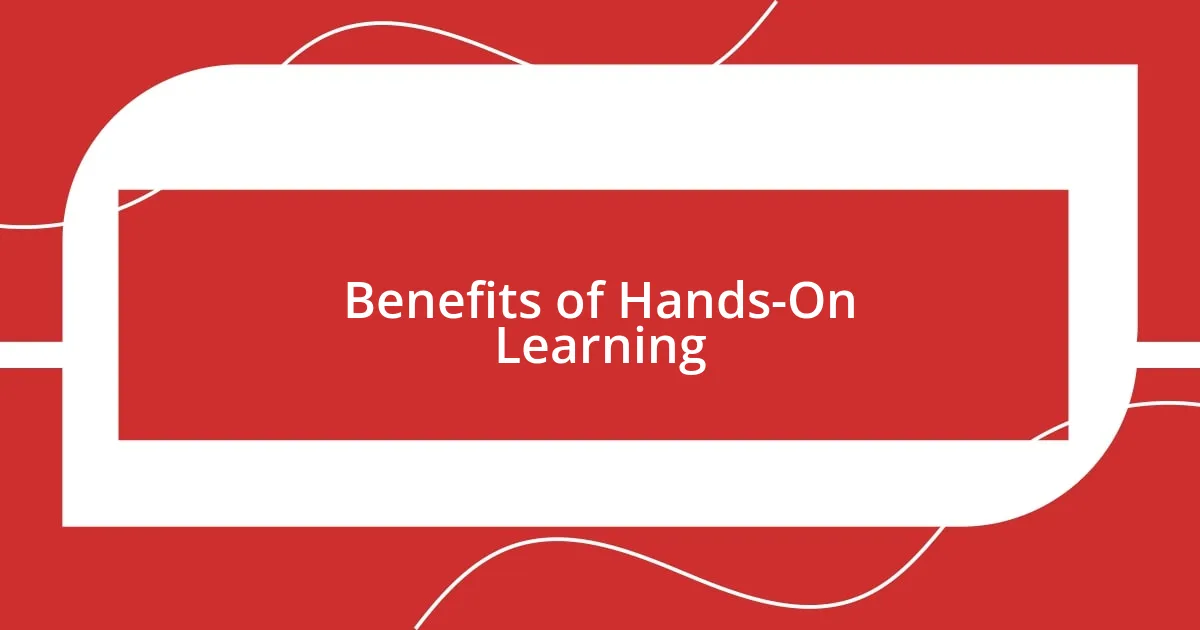
Benefits of Hands-On Learning
Hands-on learning in workshops has a profound impact. When I participated in a workshop focused on digital marketing, we worked on real-world case studies. I remember the rush of brainstorming with peers, where each idea felt like a stepping stone toward creativity. It was through this collaborative effort that I not only gained insights but also built lasting connections with others who share similar passions.
Here are some benefits of hands-on learning that I’ve truly appreciated:
- Real-World Application: Engaging in activities lets you immediately apply what you’ve learned.
- Enhanced Retention: Active participation helps imprint information in your memory far better than passive learning.
- Networking Opportunities: Workshops create a space for meeting diverse individuals, fostering relationships that can lead to future collaborations.
- Immediate Feedback: You receive direct input from facilitators and peers, helping refine your skills on the spot.
- Increased Confidence: Completing practical tasks boosts your trust in your abilities and encourages trying new things.
Reflecting on my experiences, I often find that diving into hands-on activities not only enhances my skill set but also ignites a sense of exhilaration that theoretical learning simply can’t match. Don’t you find that when you actively engage, learning becomes an adventure rather than a chore?
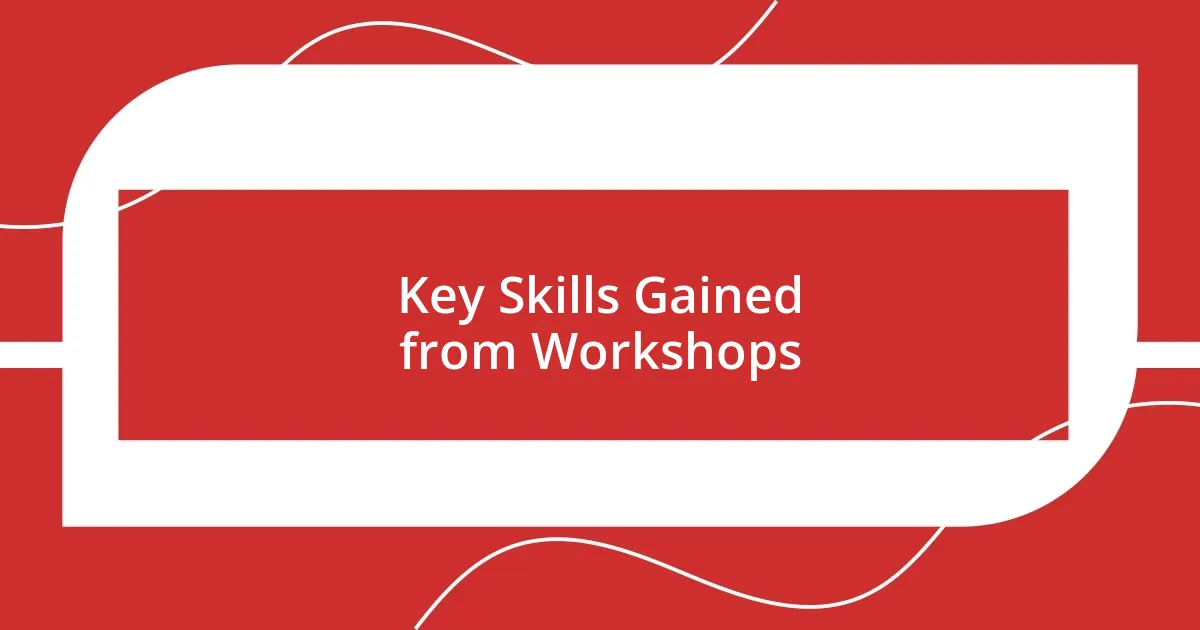
Key Skills Gained from Workshops
Attending workshops has enabled me to develop critical skills that I continue to rely on. One particularly memorable experience was in a workshop designed to enhance leadership capabilities. I remember standing before a group, trying to convey my vision for a project. The feedback I received from participants helped me refine my approach. It was a reminder of how important effective storytelling is in leadership, not just relaying information but truly connecting with your audience.
I’ve also discovered the power of adaptability through these experiences. In a recent creativity workshop, we were thrown into teams with little preparation and asked to come up with a new product idea in under an hour. The sheer unpredictability of it pushed me to think on my feet. It made me realize that in real-life situations, particularly in fast-paced environments, the ability to pivot quickly can separate success from failure. Have you ever had to adapt quickly in a challenging situation? It’s exhilarating!
Lastly, honing my problem-solving skills has been a significant takeaway for me. I recall a workshop focused on design thinking, where we tackled a community issue together. The process of ideation, prototyping, and testing solutions with my peers felt invigorating. It reinforced my belief that collaborative thinking often leads to innovative solutions that we might not arrive at individually. Each workshop experience has equipped me with skills that I carry into both my personal and professional life.
| Skills Gained | Descriptions |
|---|---|
| Effective Communication | Enhancing storytelling and connection with audiences. |
| Adaptability | Learning to pivot quickly in fast-paced environments. |
| Problem-Solving | Collaborating with others to generate innovative solutions. |
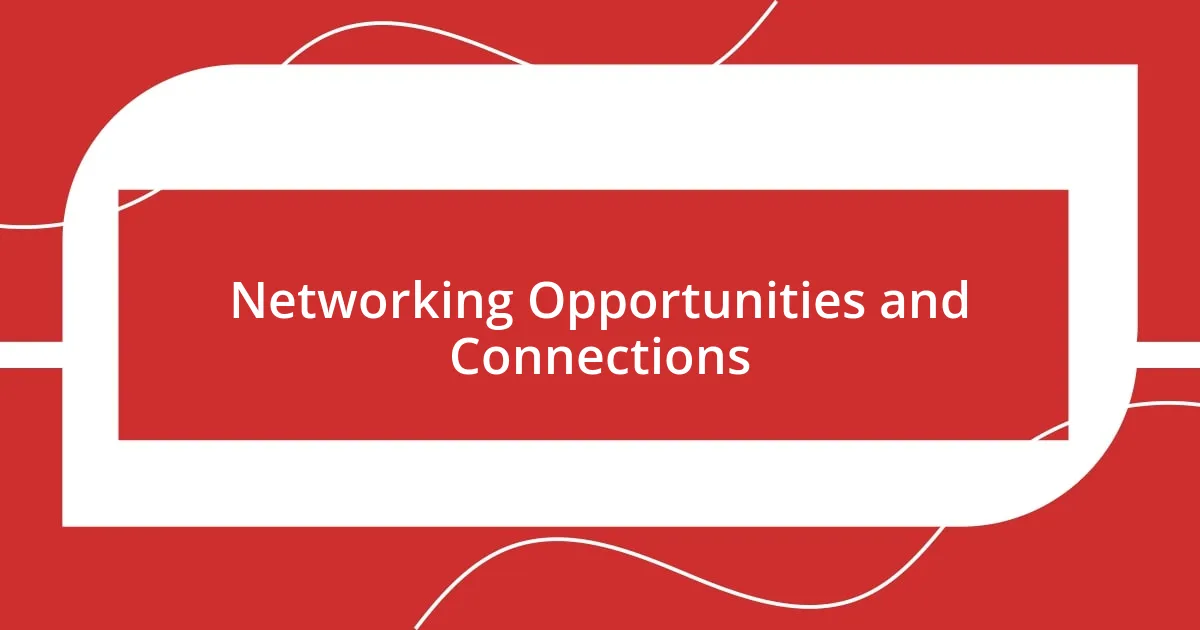
Networking Opportunities and Connections
I’ve always viewed networking as an essential part of attending workshops, and I’ve come to realize just how transformative these interactions can be. At one workshop, I sat next to someone who later became a mentor for me. We sparked a conversation about our career aspirations, and I found that sharing my goals opened doors I hadn’t even considered before. Doesn’t it feel incredible when a simple dialogue can lead to invaluable guidance and support?
Building connections at workshops isn’t just about exchanging business cards; it’s about forming genuine relationships. I recall attending a creativity workshop where we were paired with strangers for team exercises. One connection quickly turned into a friendship, leading to collaborations on several projects down the road. When you meet individuals who inspire you, don’t you feel motivated to take bolder steps in your own journey?
What’s fascinating is that these networks often extend beyond the initial event. After a workshop on innovative marketing strategies, I joined a group of participants in a follow-up online forum. The discussions sparked new ideas, and I was amazed at how this ongoing connection enriched my understanding and practice. Have you ever felt that after a workshop, the relationships you formed become a supportive community that helps push you forward? It’s something I cherish deeply.
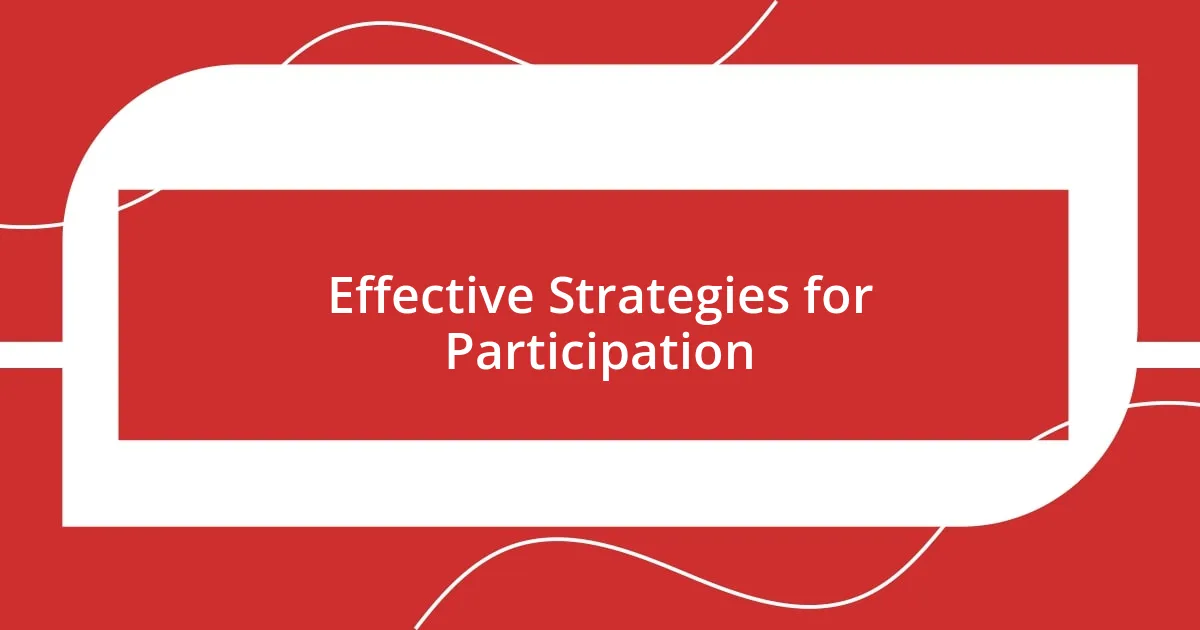
Effective Strategies for Participation
One effective strategy for participation that I’ve learned is to come prepared with specific questions in mind. In a recent workshop on personal branding, I jotted down a few key points I was struggling with, and when the floor opened for discussion, I raised my hand. The facilitator’s response not only clarified my doubts but also led to a lively conversation that benefited everyone involved. Have you ever noticed how asking the right questions can ignite more profound discussions?
Another approach that has worked wonders for me is to actively engage with fellow participants during activities. I remember attending a workshop focused on emotional intelligence, where we participated in small group exercises. By sharing personal experiences and listening intently to others, I found that my understanding deepened. Those moments of vulnerability can create bonds, and I realized how much richer the learning experience becomes when everyone feels comfortable sharing their thoughts. Isn’t it amazing how connection can enhance our comprehension?
Lastly, taking notes during workshops has proven to be an invaluable strategy. I’ve made it a habit to capture not only key insights but also my reflections and reactions. For instance, during a recent session on conflict resolution, I scribbled down a powerful quote from the speaker that resonated with me. Later, when I revisited those notes, they sparked new ideas and strategies I could implement in real life. Do you ever find that writing things down helps solidify them in your memory? It’s like creating your own personal reference guide, helping to keep the workshop’s teachings alive long after the event.
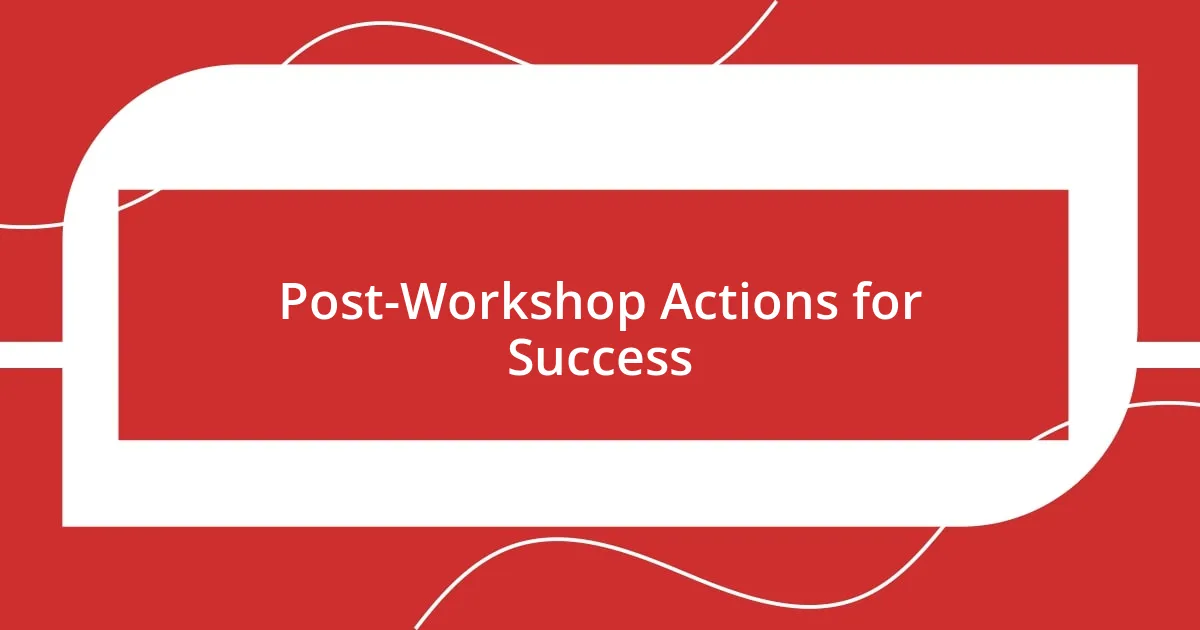
Post-Workshop Actions for Success
After attending a workshop, I find it’s crucial to reflect on what I’ve learned and how to apply it. A few days ago, after a session on leadership skills, I took the time to sit down with my notes and write a brief action plan. I identified three key strategies I could implement immediately. It felt empowering to convert inspiration into actionable steps. Have you ever noticed how reflecting on your experiences can enhance your learning journey?
One practice I’ve embraced post-workshop is reaching out to the facilitator for further insights or clarification. Recently, I attended a workshop on effective communication, and there was a topic that piqued my interest but left me with lingering questions. So, I sent an email sharing my thoughts and asking for additional resources. Not only did I receive a thoughtful response, but it also opened the door for future discussions and potentially more workshops. Isn’t it fascinating how a simple follow-up can deepen your understanding and foster lasting connections?
Consider establishing a consistent follow-up routine with your newly formed network. After a workshop where I connected with several like-minded individuals, I initiated a monthly coffee catch-up via Zoom. This has not only kept the momentum going but has also allowed us to share our progress and new challenges. I genuinely look forward to these meetings—the support and inspiration are invaluable! How do you keep your networks alive after an event? It’s all about nurturing those connections to cultivate a growth-oriented environment.



